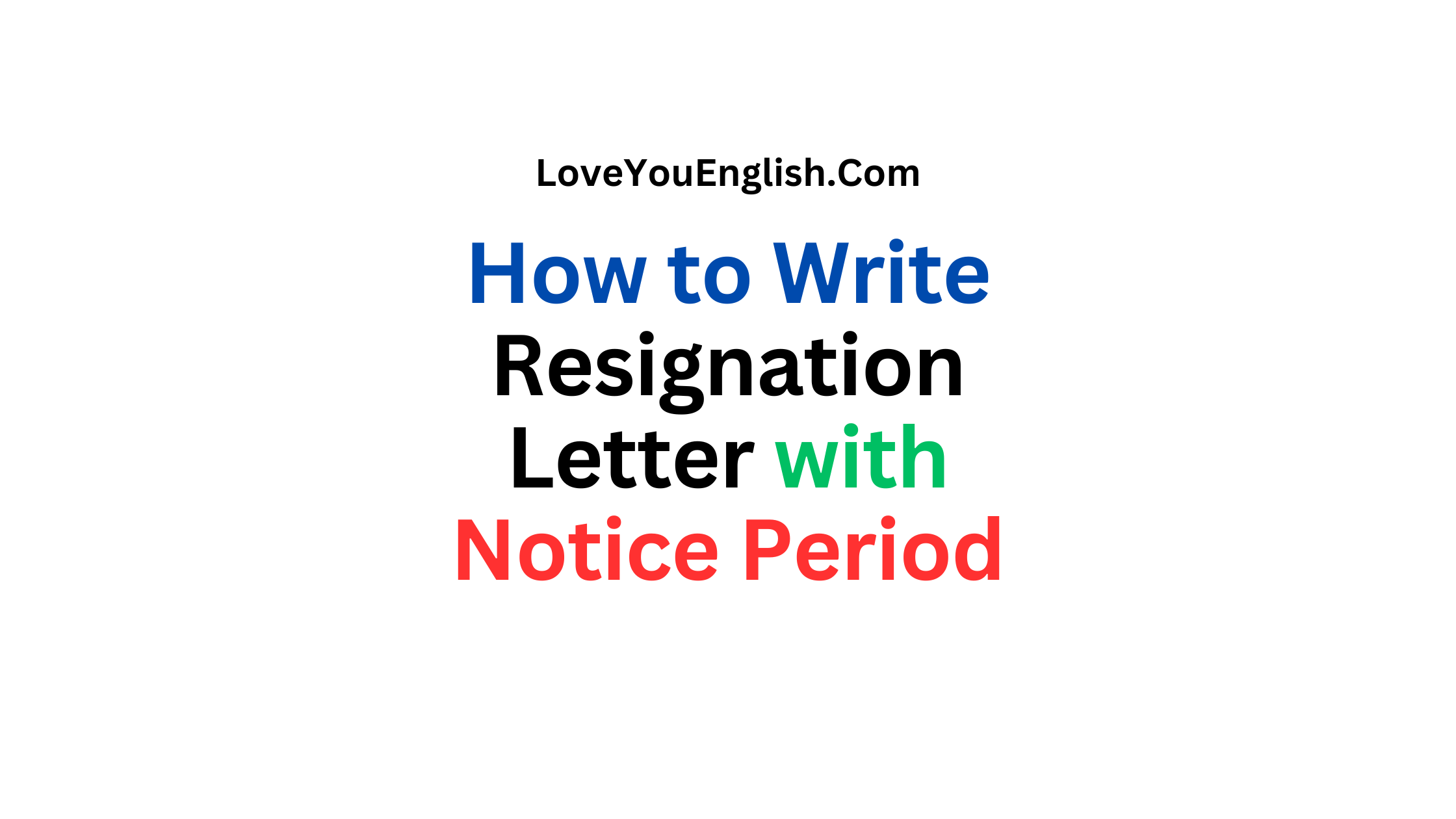How to Write a Resignation Letter with Notice Period
Writing a resignation letter can feel stressful, especially when you want to remain professional and polite. Many employees are unsure how to mention the notice period correctly or choose the right tone. This guide explains how to write a clear and professional resignation letter with a notice period. Written in simple and formal English, it is perfect for working professionals, job seekers, and English learners. A well-written resignation letter helps maintain good relationships, reflects professionalism, and ensures a smooth transition. This guide makes the process easy and stress-free.
Table of Contents
ToggleWhat is a Resignation Letter?
A resignation letter is a formal document that you give to your employer to let them know you are leaving your job.
It serves as an official record of your decision to resign and includes key details such as your last working day.
It is not only a professional courtesy but also helps your employer plan for your replacement.
Most companies have a notice period policy that employees need to follow.
A notice period is the time between the day you submit your resignation letter and your final working day.
It can range from 2 weeks to 3 months, depending on the company’s rules and your contract.
Including the notice period in your resignation letter is crucial to ensure a smooth transition.
Why is a Resignation Letter Important?
- Professionalism: A resignation letter shows that you are leaving your job respectfully and professionally.
- Clear Communication: It provides clear information about your decision to resign and your last working day.
- Positive Exit: It helps you leave the company on good terms, which is important for references and future opportunities.
- Legal Requirement: In some companies, a resignation letter with a proper notice period is mandatory to complete the resignation process.
Key Points to Include in a Resignation Letter
A resignation letter is usually short and simple.
It includes a few important details:
- Greeting: Address your letter to your immediate manager or the person responsible for handling resignations.
- Statement of Resignation: Clearly state that you are resigning from your position.
- Your Notice Period: Mention how much notice you are providing based on your company’s policy.
- Your Last Working Day: Include the exact date of your last day at work.
- Appreciation: Thank your employer for the opportunities and experiences you have gained.
- Offer to Help: Express your willingness to help with the transition, such as training your replacement.
- Closing Statement: End the letter on a positive note with your contact information for future communication.
Let’s take a closer look at each of these points.
Step-by-Step Guide to Writing a Resignation Letter
1. Start with a Professional Greeting
Address your resignation letter to the correct person.
Usually, this will be your immediate supervisor or manager.
If you work in a large organization, you may also need to send a copy to the HR department.
Examples of professional greetings:
- Dear [Manager’s Name],
- Dear [Supervisor’s Name],
- To [Manager’s Full Name],
2. State Your Intent to Resign
Begin the letter by clearly stating your intention to resign.
Be polite and professional. Keep it short and to the point.
Example:
I am writing to formally resign from my position as [Your Job Title] at [Company Name].
3. Mention Your Notice Period
Inform your employer of the notice period you are providing.
Refer to your contract or company policy to ensure you include the correct notice period.
Example:
As per the company policy, I am providing [X weeks/months] of notice. My last working day will be [specific date].
4. Show Gratitude and Appreciation
Take a moment to thank your employer for the opportunities and experiences you had while working at the company.
This shows maturity and professionalism.
Example:
I would like to express my sincere gratitude for the opportunities I have had during my time at [Company Name]. I appreciate the support, learning experiences, and professional growth I gained under your leadership.
5. Offer to Help with the Transition
To ensure a smooth transition, offer your assistance.
You can mention that you will help train your replacement or complete pending tasks during your notice period.
Example:
I am committed to making this transition as smooth as possible. I will complete all my responsibilities and assist in training my replacement during my notice period.
6. End on a Positive Note
Close your letter politely and professionally.
Include your contact information if needed and express good wishes for the company’s future.
Example:
Thank you once again for the opportunity to be part of [Company Name]. I look forward to staying in touch, and I wish the company continued success.
Sign off with:
- Sincerely,
- Best regards,
- Yours faithfully,
Followed by your name.
Sample Resignation Letters with Notice Period
Here are two examples to help you understand how to write a resignation letter with notice.
Example 1: Resignation Letter with Two Weeks’ Notice
Dear [Manager’s Name],
I am writing to formally resign from my position as Sales Executive at ABC Company. As per company policy, I am providing two weeks’ notice, and my last working day will be [specific date].
I would like to express my sincere gratitude for the opportunities I have received during my time at ABC Company. Working with such a talented team has been an incredible learning experience, and I am grateful for the support and guidance you have provided.
I will do everything I can to ensure a smooth transition. Please let me know if there’s anything specific you would like me to focus on during my notice period.
Thank you once again for the support and encouragement. I wish the team and company continued success.
Sincerely,
[Your Name]
Example 2: Resignation Letter with One Month’s Notice
Dear [Manager’s Name],
I am writing to formally resign from my role as Software Developer at XYZ Technologies. In accordance with the company’s policy, I am providing one month’s notice, and my last working day will be [specific date].
I want to take this opportunity to thank you for all the opportunities and experiences I have gained while working at XYZ Technologies. I have grown both personally and professionally during my time here, and I appreciate the support of my team and leadership.
I will ensure that all my responsibilities are completed and assist in training my replacement to ensure a smooth handover process.
Thank you once again for your understanding. I look forward to staying in touch, and I wish XYZ Technologies continued success in the future.
Best regards,
[Your Name]
Important Tips for Writing a Resignation Letter
- Keep It Professional: Avoid using informal language or negative comments about the company or your coworkers.
- Be Clear and Concise: Your letter should be short and direct, with all necessary details.
- Check Your Notice Period: Make sure you follow the company’s notice period policy.
- Proofread Your Letter: Check for any spelling or grammar errors to ensure the letter looks polished and professional.
- Be Grateful: Show appreciation for the opportunities you received, even if you had challenges.
- Discuss in Person First: Before submitting your letter, inform your manager about your resignation in a private meeting.
- Follow Company Guidelines: Some companies may have specific requirements for submitting a resignation letter, such as using a company email template.
Frequently Asked Questions (FAQs)
1. Should I include the reason for my resignation in the letter?
Including the reason for resigning is optional. If you choose to mention it, keep it simple and positive.
2. Can I resign without serving the notice period?
In most cases, you are required to serve the notice period. If you cannot, discuss it with your employer and find a mutual agreement.
3. Can I send my resignation letter via email?
Yes, sending your resignation letter via email is acceptable, especially if your company allows it. Make sure the email is professional and includes all necessary details.
4. How long should a resignation letter be?
A resignation letter should be brief and to the point, typically no longer than one page.
Final words
Writing a professional resignation letter with a notice period is an important part of leaving your job.
By following the steps and tips in this blog, you can create a letter that is polite, clear, and professional.
Always check your company’s notice period policy and ensure you provide enough time for a smooth transition.
Remember, a well-written resignation letter helps you leave on good terms and keeps doors open for future opportunities.
It’s a small but important step toward your next career adventure.
Good luck!






